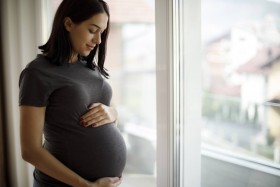Planning a Safe Home Birth During the Coronavirus Pandemic

Even though hospital births are by far the most common place for expectant mothers to give birth, they’re not the only option. Every year, about 1.6% of all births in the United States are home births and about 0.5% occur in freestanding birthing centers. Women who choose to give birth outside of a hospital have many reasons for deciding to do so, but in light of the coronavirus pandemic, a growing number of expectant mothers are starting to consider home births as an option for themselves.
For some people, that interest stems from restrictions being placed on hospital deliveries. To limit the spread of coronavirus, many hospitals have been limiting the number of people who are allowed to be present for the birth. In some cases, hospitals have even stopped allowing partners to be there for the birth. Others would like to avoid going to the hospital unless it’s absolutely necessary and are concerned about shortages of protective gear for doctors and nurses. Given the strain hospitals have been under, some expectant mothers also feel like that if it is safe for them to give birth at home, they would like to allow more resources for those who do need a hospital birth.
At this time, the American Academy of Pediatrics (AAP) doesn’t specifically recommend home births. But if you would like to consider a home birth, they advise that they are safest for women carrying one child, are at least 37 weeks pregnant, don’t have any health conditions that could complicate a delivery. Some of these health conditions include preeclampsia and diabetes. Home births are also being advised as being best for women who have not had a previous C-section. Since these types of factors can lead to more complicated deliveries, it’s best that they be handled in a hospital where doctors will be better able to prevent birth trauma.
If you are considered a good candidate for a home birth and you’re looking for a midwife to work with, make sure to ask about their certifications. You want to find a midwife who has been certified by the American Midwifery Certification Board or have a license that meets the International Confederation of Midwives’ Global Standards for Midwifery Education for practicing in a regulated system. As you talk to potential midwives, be sure to ask about what training and equipment they have to handle emergency situations.
It’s also important to note that having two professionals attending your birth is better than having one. The AAP and the American Heart Association both recommend that one professional be on hand to care for the mother while the other is able to take care of the baby.
Even though home births are best for women with a low risk of complications, emergencies can still happen. Think about how close the nearest hospital is and how you will get there if your delivery becomes complicated. You can also contact your local hospital ahead of delivery to let them know that you’re planning a home delivery. This way, if you need to be transferred to a hospital, they will have some background information about you.
The coronavirus pandemic is an extremely stressful time to have a baby and it’s added a lot of uncertainty to the situation. Whether your child was born at home, in a birthing center, or in a hospital, and they sustained an injury around the time of birth, don’t hesitate to get in touch with a birth trauma lawyer. When it comes down to it, many cases of birth trauma are the result of medical negligence and a lawyer can help you understand your legal options. At Goodwin & Scieszka, we’ve worked with the parents of many children who have been harmed by birth trauma here in Michigan. Contact us today for help with your case.
Image: iStock / damircudic






